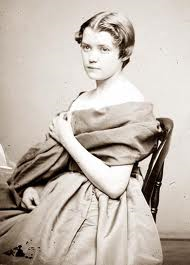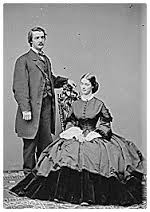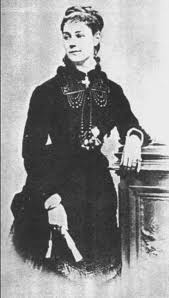 Capital Heartbreaker, Kate Chase, was the unofficial Queen of Washington, during the Civil War, definitely outshining, Lincoln’s 1st Lady and capturing the heart and soul of many influential power brokers in the nation’s Capital. Kate was charming, seductive, aloof, brilliant, well-educated, fluent in several languages, devoted to her father’s political success and had every intention to become the Capital’s 1st Lady, when she manipulated daddy’s presidential aspirations. Capital Kate was super adept and talented in one specific regard, she really knew how to spend money, when her father’s ran short, she latched onto an almost unlimited source, that would eventually lead to her undoing.
Capital Heartbreaker, Kate Chase, was the unofficial Queen of Washington, during the Civil War, definitely outshining, Lincoln’s 1st Lady and capturing the heart and soul of many influential power brokers in the nation’s Capital. Kate was charming, seductive, aloof, brilliant, well-educated, fluent in several languages, devoted to her father’s political success and had every intention to become the Capital’s 1st Lady, when she manipulated daddy’s presidential aspirations. Capital Kate was super adept and talented in one specific regard, she really knew how to spend money, when her father’s ran short, she latched onto an almost unlimited source, that would eventually lead to her undoing.
Katherine Jane Chase, was born on August 13, 1840, in Cincinnati, Ohio. Katherine’s father, Salmon P. Chase, a powerful Ohio politician, didn’t have much luck with wives, the three he married all died within a few years of the nuptials. Kate, the daughter of the second spouse, who died when she was five, was packed off to the Haines Boarding School in New York City for nine years, schooled in several languages, elocution, the social graces, along with music and history.
 Kate returned to Columbus, Ohio at 14, to her newly widowed father and became the official hostess to the recently elected Governor of Ohio, Salmon P. Chase. Her father took the opportunity to tutor young Kate and had her study from his extensive personal library. She was a quick study and absorbed everything that was assigned. Kate impressed most of the visiting politicos of the era with her sophistication, wisdom and knowledge. One visitor to the Governor’s home described the blooming beauty thusly,
Kate returned to Columbus, Ohio at 14, to her newly widowed father and became the official hostess to the recently elected Governor of Ohio, Salmon P. Chase. Her father took the opportunity to tutor young Kate and had her study from his extensive personal library. She was a quick study and absorbed everything that was assigned. Kate impressed most of the visiting politicos of the era with her sophistication, wisdom and knowledge. One visitor to the Governor’s home described the blooming beauty thusly,
“She was about eighteen years old, tall and slender and exceedingly well formed. . . . Her little nose, somewhat audaciously tipped up, could perhaps not have passed muster with a severe critic, but it fitted pleasingly into her face with its large, languid, but at the same time vivacious hazel eyes, shaded by long dark lashes and arched over by proud eyebrows. The fine forehead was framed in waving, gold-brown hair. She had something imperial in the pose of the head, and all her movements possessed an exquisite natural charm. No wonder that she came to be admired as a great beauty and broke many hearts. After the usual commonplaces, the conversation at the breakfast table, in which Miss Kate took a lively and remarkably intelligent part, soon turned itself upon politics.”
Just three days after being elected to the United States Senate, in 1860, new President Abraham Lincoln, appointed Salmon Chase as his Secretary of the Treasury. Daughter Kate who had already spent a small fortune on New York designer dresses and a complete makeover of the Ohio Governor’s Mansion, found herself thrust into the social whirl of a larger stage, in the national spotlight, where her father’s presidential ambitions could be further endorsed.
Historian Doris Kearns writes,
“Kate’s dynamic grace and intellect made her the most interesting woman in any gathering, as well as a critical force behind her father’s drive for the presidency. [Her] father’s ambitions and dreams became the ruling passions of her life. She gradually made herself absolutely essential to him, helping with his correspondence, editing his speeches, discussing political strategy, entertaining his friends and colleagues. While other girls her age focused on the social calendar of balls and soirees, she concentrated all her energies on furthering her father’s political career.”
During the Civil War, Kate had many suitors, among them General Garfield and Lincoln Secretary John Hay. However, Capital Kate set her sights on one prospect that had all the attributes she considered relevant, the wealthy and sophisticated “boy governor” of Rhode Island, William Sprague IV. The governor had some minor shortcomings that Kate felt that she could manage, an uncontrollable temper, a passion for womanizing and a severe drinking problem, but his wealth and political connections could make up for most of these social maladies.
Presidential Secretary, John Hay, heartbroken, wrote a friend,
“The town is dull. Miss Chase is so busy making her father next President that she is only a little lovelier than all other women. She is to be married on November 12th which disgusts me with life. She is a great woman and with a great future.”
 Kate Chase married William Sprague on November 12, 1863. Their extravagant wedding invited criticism but was attended by everybody who was anybody in Washington. Kate wore a dress of white velvet. Her lace veil was capped by a tiara of pearls and diamonds was a gift from William that cost more than $50,000. As the bride entered the room, the Marine Band played “The Kate Chase March” which composer Thomas Mark Clark had written for the occasion.
Kate Chase married William Sprague on November 12, 1863. Their extravagant wedding invited criticism but was attended by everybody who was anybody in Washington. Kate wore a dress of white velvet. Her lace veil was capped by a tiara of pearls and diamonds was a gift from William that cost more than $50,000. As the bride entered the room, the Marine Band played “The Kate Chase March” which composer Thomas Mark Clark had written for the occasion.
Presidential aide William O. Stoddard wrote:
“The social event of the past week was the wedding of Senator Sprague and Miss Chase. Never did anything go off more neatly. The ‘tableau,’ as they call it, at the marriage itself was charming; and the dress reception in the evening, and the informal one next day, were entirely pleasant. The presents were magnificent – silver, pearls, diamonds, &c., to the tune of a hundred thousand or so. The worthy young couple certainly have a very fair start in life, and hosts of friends to wish them joy and success.”
Kate Chase Sprague was politically astute and economically naive. Her extravagances annoyed her new husband and contributed to the marital difficulties they soon experienced. The Sprague’s had four children and it seemed a charmed marriage, but William’s weakness for alcohol, his constant philandering, and his verbal and physical abuse of his wife told another story. Kate’s devotion to her father may have caused some of the early tension in her marriage. She continued to serve as his chief political aide, even while she was pregnant.
Kate worked behind the scenes to assist her father in his effort to win the 1864 Republican nomination for President from Lincoln, when the President discovered the intrigue, Chase tendered his resignation and Lincoln accepted. President Lincoln didn’t want to alienate the Ohio powerbroker, so when an opening became available on the Supreme Court, he offered the position to Chase. Salmon P. Chase became the 6th Chief Justice of the Supreme Court, still harboring a yearning for another presidential nomination.
Despite his position on the Supreme Court, Chase let it be known in 1868 that he was available as a candidate for the Presidency. He switched parties from the Republicans to the Democrats, hoping they would nominate him. In that summer of 1868, Kate ran her father’s campaign for the Democratic nomination from their hotel on Fifth Avenue in New York City, where the convention was being held.
Although tradition prevented a woman’s appearance on the convention floor, Kate did much of the back-room maneuvering to win the nomination. However, the convention ended up nominating Horatio Seymour, the Governor of New York, whom Kate had been counting on to place her father’s name in nomination. Salmon Chase then retired to his Edgewood estate, just outside Washington, DC, where Kate visited him frequently.
 After her father’s death, Kate’s marriage deteriorated further with Sprague’s infidelities, alcoholism and constant belittling. Sprague’s financial and political fortunes rapidly worsened in 1873 and through extended periods of estrangement, accounts of the era relate that before an 1882 divorce, Kate was accused of having an affair with the powerful New York Senator Roscoe Conkling. According to a well-known story, Sprague confronted the philandering couple at Sprague’s Rhode Island summer home and pursued Conkling with a shotgun and threatened to throw Kate out of a second story window.
After her father’s death, Kate’s marriage deteriorated further with Sprague’s infidelities, alcoholism and constant belittling. Sprague’s financial and political fortunes rapidly worsened in 1873 and through extended periods of estrangement, accounts of the era relate that before an 1882 divorce, Kate was accused of having an affair with the powerful New York Senator Roscoe Conkling. According to a well-known story, Sprague confronted the philandering couple at Sprague’s Rhode Island summer home and pursued Conkling with a shotgun and threatened to throw Kate out of a second story window.
By 1890 and after her son’s suicide, Capital Kate, became a near recluse, destitute and friendless on her “Edgewood” estate outside Washington. She died of a kidney ailment on July 31, 1899 and was laid to rest, next to her father, at the Spring Grove Cemetery in Cincinnati, Ohio. The Enquirer memorialized Katherine Jane Chase stating,
“No Queen has ever reigned under the Stars and Stripes, but this remarkable woman came closer to being Queen than any American woman has.”
Capital Heartbreaker, Kate Chase, was the Queen of Washington during the Civil War, brilliant, beautiful and an aggressive political woman knowing what she wanted, but maybe a little naive of the necessities of attaining her goals.
Bummer


The information concerning her & her following is fascinating. Mrs. Lincoln felt she was a real threat -for good reason. There is much information in the impressive book: Great Captain – by Honore’ Morrow. An exceptional book.
Nancy,
Thanks for the read. Kate could be a real threat in any arena. Too bad she hooked up with the wrong politician. Will put “Great Captain” on the to read list. Doris Kearns gives a good insight also. Thanks again for visiting.
Bummer
Can’t help but think she was born too early – she was obviously cut out for a political career of her own. That wouldn’t have pleased Mary Todd Lincoln but she sounds like she would have been a better politician than Sprague.
Louis,
Right, too early. Abmbitious and brilliant. Had all the moves, the knowledge and the motive. With the correct man she would have been a powerful 1st lady. In another era a great politician, in her own right.
Bummer